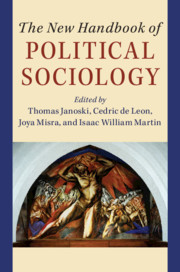Book contents
- The New Handbook of Political Sociology
- The New Handbook of Political Sociology
- Copyright page
- Dedication
- Contents
- Tables
- Figures
- Contributors
- Acknowledgments
- Introduction
- I Theories of Political Sociology
- II Media Explosion, Knowledge as Power, and Demographic Reversals
- III The State and Its Political Organizations
- 15 The Political Economy of the Capitalist State
- 16 States as Institutions
- 17 Nation-State Formation
- 18 The Political Sociology of Public Finance and the Fiscal Sociology of Politics
- 19 Politics, Institutions, and the Carceral State
- 20 The Political Sociology of Democracy
- 21 Revolutions against the State
- IV Civil Society: The Roots and Processes of Political Action
- V Established and New State Policies and Innovations
- VI Globalization and New and Bigger Sources of Power and Resistance
- Index
- References
16 - States as Institutions
from III - The State and Its Political Organizations
Published online by Cambridge University Press: 22 February 2020
- The New Handbook of Political Sociology
- The New Handbook of Political Sociology
- Copyright page
- Dedication
- Contents
- Tables
- Figures
- Contributors
- Acknowledgments
- Introduction
- I Theories of Political Sociology
- II Media Explosion, Knowledge as Power, and Demographic Reversals
- III The State and Its Political Organizations
- 15 The Political Economy of the Capitalist State
- 16 States as Institutions
- 17 Nation-State Formation
- 18 The Political Sociology of Public Finance and the Fiscal Sociology of Politics
- 19 Politics, Institutions, and the Carceral State
- 20 The Political Sociology of Democracy
- 21 Revolutions against the State
- IV Civil Society: The Roots and Processes of Political Action
- V Established and New State Policies and Innovations
- VI Globalization and New and Bigger Sources of Power and Resistance
- Index
- References
Summary
During the 1980s, the state was “brought back in” to political sociology (Evans, Rueschemeyer, and Skocpol 1985), but its reappearance has taken a number of forms. For many scholars, the state returned in the role of a dominant actor or as a centralized organizational vehicle controlled by political elites and bureaucratic officials. Others conceptualized the state as the locus of “exchange” of social capitals among other domains (Bourdieu 2014) or as a centralized node harnessed to interlinked power networks that “penetrate” the economy and civil society within a particular territory (Mann 1986; Mitchell 1991). Still others envisioned the state as a concatenation of problem-solving projects or “assemblages” (Clemens 2006; Joyce and Mukerji 2017; Loveman 2005) rather than a bounded, coherent, hierarchical organization.
- Type
- Chapter
- Information
- The New Handbook of Political Sociology , pp. 435 - 457Publisher: Cambridge University PressPrint publication year: 2020
References
- 3
- Cited by

